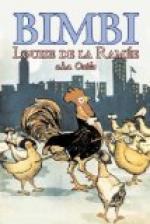His lips quivered with a broken sob.
“And have you truly traveled inside this stove all the way from Tyrol?”
“Yes,” said August; “no one thought to look inside till you did.”
The king laughed; then another view of the matter occurred to him.
“Who bought the stove of your father?” he inquired.
“Traders of Munich,” said August, who did not know that he ought not to have spoken to the king as to a simple citizen, and whose little brain was whirling and spinning dizzily round its one central idea.
“What sum did they pay your father, do you know?” asked the sovereign.
“Two hundred florins,” said August, with a great sigh of shame. “It was so much money, and he is so poor, and there are so many of us.”
The king turned to his gentlemen-in-waiting. “Did these dealers of Munich come with the stove?”
He was answered in the affirmative. He desired them to be sought for and brought before him. As one of his chamberlains hastened on the errand, the monarch looked at August with compassion.
“You are very pale, little fellow; when did you eat last?”
“I had some bread and sausage with me; yesterday afternoon I finished it.”
“You would like to eat now?”
“If I might have a little water I would be glad; my throat is very dry.”
The king had water and wine brought for him, and cake also; but August, though he drank eagerly, could not swallow anything. His mind was in too great a tumult.
“May I stay with Hirschvogel?—may I stay?” he said, with feverish agitation.
“Wait a little,” said the king, and asked abruptly, “What do you wish to be when you are a man?”
“A painter. I wish to be what Hirschvogel was—I mean the master that made my Hirschvogel.”
“I understand,” said the king.
Then the two dealers were brought into their sovereign’s presence. They were so terribly alarmed, not being either so innocent or so ignorant as August was, that they were trembling as though they were being led to the slaughter, and they were so utterly astonished too at a child having come all the way from Tyrol in the stove, as a gentleman of the court had just told them this child had done, that they could not tell what to say or where to look, and presented a very foolish aspect indeed.
“Did you buy this Nurnberg stove of this boy’s father for two hundred florins?” the king asked them; and his voice was no longer soft and kind as it had been when addressing the child, but very stern.
“Yes, your majesty,” murmured the trembling traders.
“And how much did the gentleman who purchased it for me give to you?”
“Two thousand ducats, your majesty,” muttered the dealers, frightened out of their wits, and telling the truth in their fright.
The gentleman was not present: he was a trusted counselor in art matters of the king’s, and often made purchases for him.




